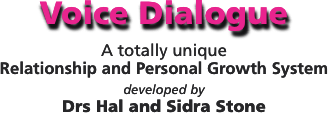Issue 7 October 2003
About Vulnerability
By Hal Stone, Ph.D. and Sidra L. Stone, Ph.D.
Susan is a powerful woman; a successful, self-made, independent woman and proud of it. She is someone who is clearly in charge of her life. Susan is judgmental of people who are weak, sensitive, or needy. She thinks of them as “wimps who are unable to stand on their own two feet”.
Early one morning, Susan is awakened by a very disturbing dream image and try as she might, she cannot get it out of her mind. She dreamt that she was in her kitchen getting ready to cook dinner. When she opened her refrigerator, she was horrified to find a very young child curled up in the back of the top shelf. This child was blue – perhaps frozen to death – and had apparently been there for some time. Susan knew that this was her fault, that this infant had been her responsibility.
Why does Susan have a dream like this? What does it mean?
This dream is a wake up call. It is a direct message from her unconscious to tell Susan that she is neglecting an important part of her life. She is neglecting her own vulnerable inner child. As she goes about her life in the world – a world that is basically not kind to vulnerable children – she has left her own vulnerability behind. While the outer Susan seems to be flourishing, an inner Susan is alone and freezing.
Susan, like the rest of us, needed to learn to live in this world. It was important to find ways of protecting her vulnerability by developing a powerful personality made up of her primary selves (as we describe in our Voice Dialogue video series and in our books) or she would have grown up a victim, totally at the mercy of others and not able to deal with the harshness of life. So she neglected this inner vulnerable child (basically “put her on ice”) while she was building her life, going to school, learning how to be successful in the world, and establishing herself professionally. But now, Susan’s soul needs are coming forward, and her unconscious is clearly telling her that it is time to go back and to pick up what she left behind. The message is compelling; the image is lodged firmly in her mind.
When we talk about vulnerability or this vulnerable inner child in our work, we are not talking about weakness. What we are talking about is the basic sensitivity of all human beings. We humans are a finely tuned species. Most of us know very little about the fineness of this inner tuning. But all of us are amazingly sensitive to the world around us – particularly to other people and their moods and to the ambience of our physical surroundings. We respond with attraction or with discomfort and repulsion. We respond with warm, safe feelings or with anxiety, fear, and loneliness
If you know about your vulnerability – or this sensitivity – you can take care of it yourself consciously and with choice. Otherwise, it will be cared for unconsciously or automatically in your relationships. These relationships can be with spouses, parents, children, friends, colleagues, workers, bosses, teachers, political leaders, or pets. It can even be cared for unconsciously – by your computer or your TV.
All of us can be manipulated through this vulnerability and the “spin doctors” of the world know very well how to do this. Advertising people use our vulnerability to sell products. First they make us vulnerable by making us afraid of being inferior or unloved. Then they give us the solution – everything from sweeter breath and better soap products, to Hummers (military-type cars), to larger breasts or penises. Our politicians are playing upon our vulnerability just now by emphasizing danger. And, just like the advertising people, once they make us vulnerable, they come forth with a solution – their own agenda.
Why is this important? As we say in our Voice Dialogue video series – and in all of our books – caring for one’s own vulnerability is indispensable for anyone who wants the freedom of choice in life. It is also the very foundation for a good relationship. This is so important that we devote sections of our books and the videos to this vulnerability and to some of the ways in which you can care for your own.
If you are not aware of your own vulnerability and you don’t take care of it consciously, you have unconsciously placed your sensitivities and needs in the hands of others and – in the deepest sense – you’re very vulnerable in life. Paradoxically, i t is embracing this very vulnerability, this fine tuning, that can help you to enjoy life – to appreciate beauty, to feel wonder, to enjoy silence and “being” time, and to make the deepest and most delicious intimate connections with others.

